Subscribe now and get the latest podcast releases delivered straight to your inbox.
We do it automatically and without even thinking about it. We apologize, we kowtow, we euphemize. And that’s just the tip of the iceberg. In every conversation, we’re weakening our own message in a hundred little ways.
Sometimes we avoid being direct because we’re worried we’ll come off as too aggressive or cold. Sometimes we fill conversations with fluff because we don’t like the sound of silence.
These tendencies are all too common, and, added together, they’re having a profoundly negative effect on how we communicate. If the professional communication you’re doing is with a client, customer, or prospect, you’re hurting your chances to reach the outcome you’re hoping for.
Chris Marr is a They Ask, You Answer coach at IMPACT and the author of Become an Authoritative Coach. He works directly with businesses to help them improve the way they interact with customers — both in marketing and sales.
He’s been on a crusade for years to help professionals be more direct and candid in their conversations and correspondence.
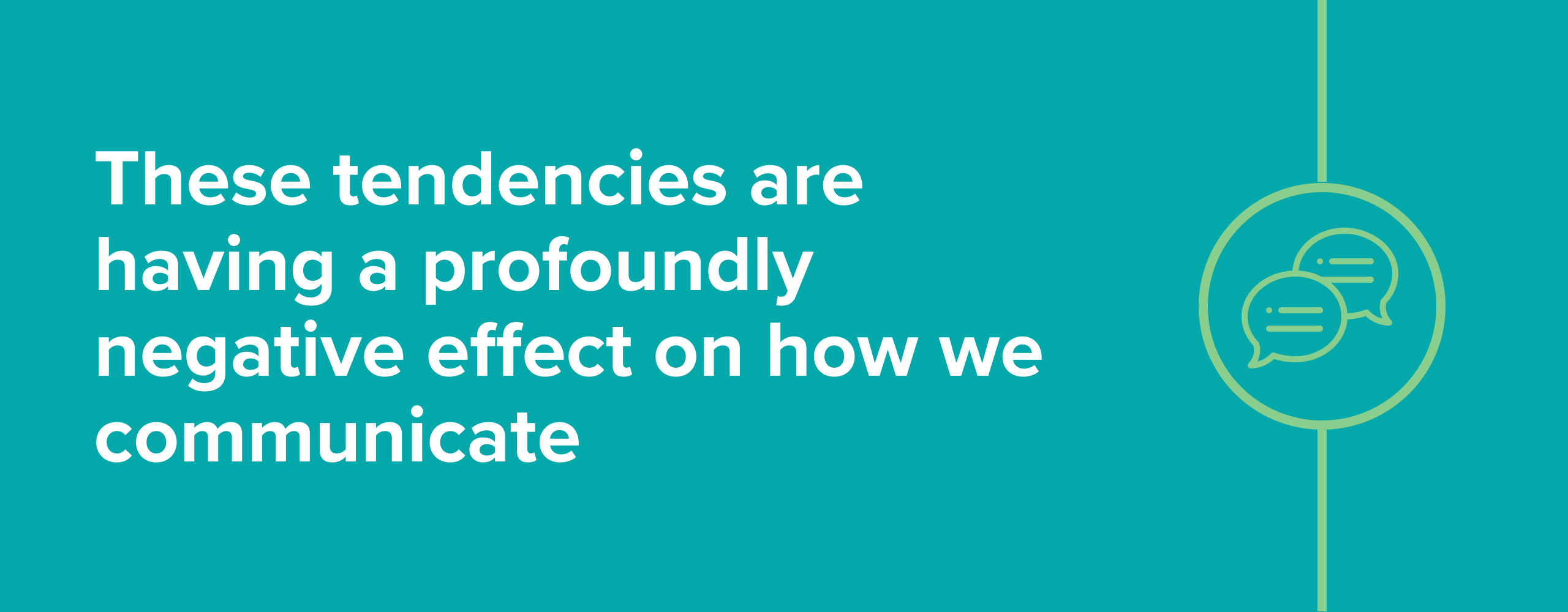
He believes salespeople should be practicing radical candor, as it’s been called by Kim Scott. This means being direct and straightforward in all communication so that you don’t undermine your message without realizing it.
But being candid and having authority isn’t the same thing as being authoritative, he warns. It’s about guiding conversations so they’re more productive — and avoiding fluff when it’s not necessary.
Below, we'll dive into some steps you can take to banish weak, wishy-washy language from your sales conversations.
We'll cover:
- Why we often default to apology.
- Establishing (and redefining) the "alpha" role in a conversation.
- Training yourself to be more direct.
- Taking the first step toward eliminating weak language from your communication.
As John Dewey famously said, a problem well-stated is a problem half-solved. Like with anything else, the first step to improvement is understanding the challenge we face.
With that, Let's dive in.
Why do we default to apology?
It’s the end of a sales call and things are wrapping up between sales rep and prospect.
“Thanks so much for your time today!”
So, who thanks whom for their time? Of course we want to be courteous and affable in conversation, but is one person’s time more or less valuable than the other’s?
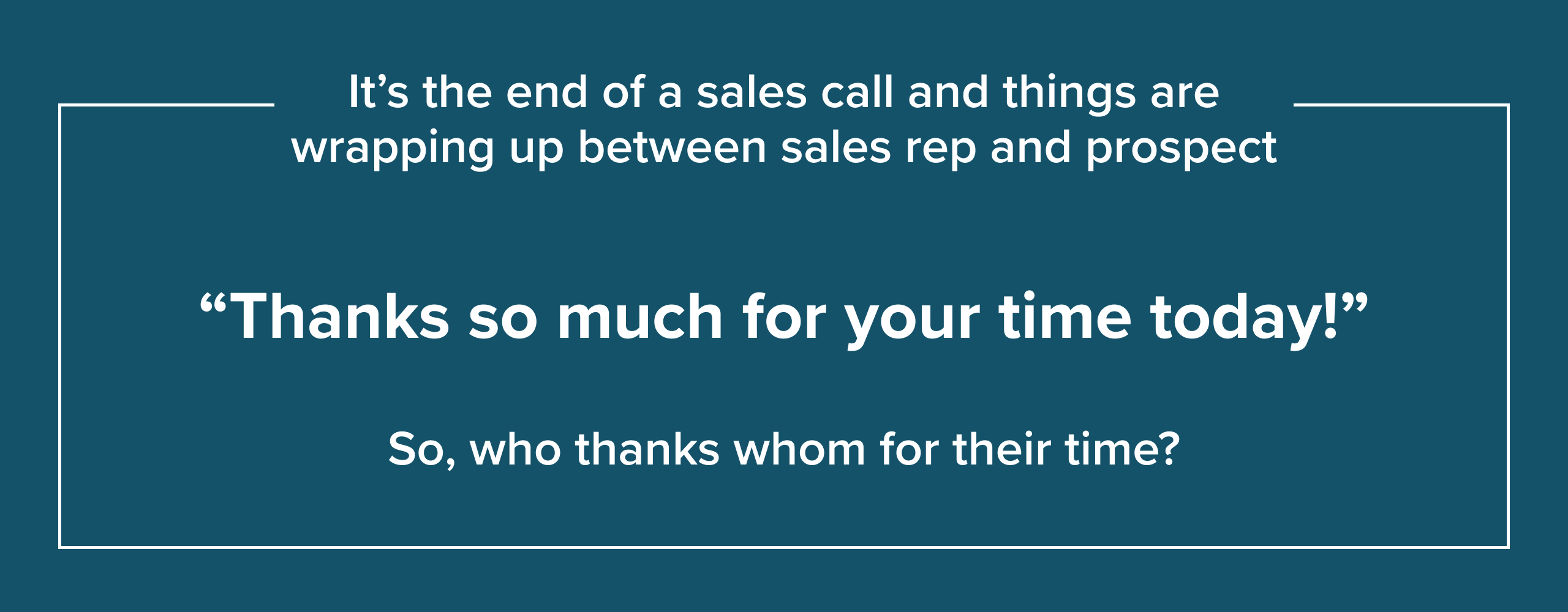
Too often, says Chris, sales reps are thanking the prospects, not the other way around. The implication is that the prospect’s time is more valuable than the sales rep’s — and that the prospect was being generous by showing up.
This is the wrong approach, according to Chris, because it gives the impression that the prospect is doing the sales rep a favor. As a result, the sales rep loses the position of authority in the conversation.
A better model would be this: each party’s time is seen as having equal value. No one needs to apologize for taking up the other’s time.
This way, when the sales rep sets out the goals for the meeting and directs the conversation, it’s based on a foundation of equality.
Defining and establishing the ‘alpha’ role
Conversations that begin on equal footing tend to meander. Unless there is a clear hierarchy, it’s hard for either side to establish an intended endpoint.
Chris recommends salespeople work to establish themselves as the ‘alpha’ in the conversation.
Chris is quick to remind us that being the alpha is not what many of us think. “People have the wrong idea, of what an alpha looks like,” he says. “They think it's this aggressive, obnoxious, pushy bully, but that's not the case. All we're looking for is some authority.”
When a salesperson has authority in a meeting, she can set the agenda, move from one topic to another, direct discussion, and be clear about desired outcomes. A salesperson demonstrates that authority at the beginning of a call by saying something like, “By the end of our meeting today I want us both to be clear about which option is the best fit for you.”
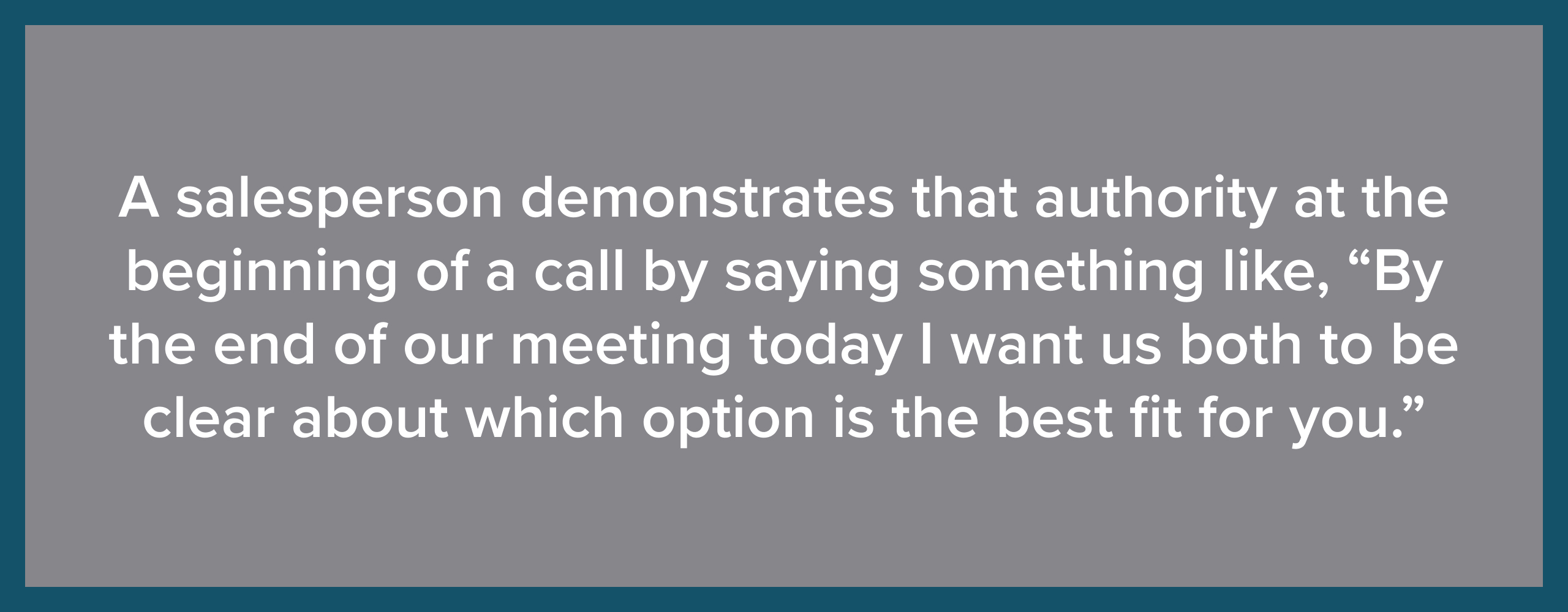
By contrast, a salesperson is giving up authority when they replace this candor with weak, vague language that's less direct. As a result, conversations are less likely to reach the desired outcome.
Training yourself to be more direct
As a business coach, Chris works directly with sales teams to hone their communication skills — helping them see the weak language that’s hiding in plain sight.
If you're looking to improve as a communicator, this kind of coaching is the best way to get there.
But even without a dedicated outside coach you can begin to improve your communication with clients and prospects.
It starts with recording your sales calls.
Working with a partner or by yourself, scrutinize a single call to carefully observe the language you used — particularly at the beginning and end of the call.
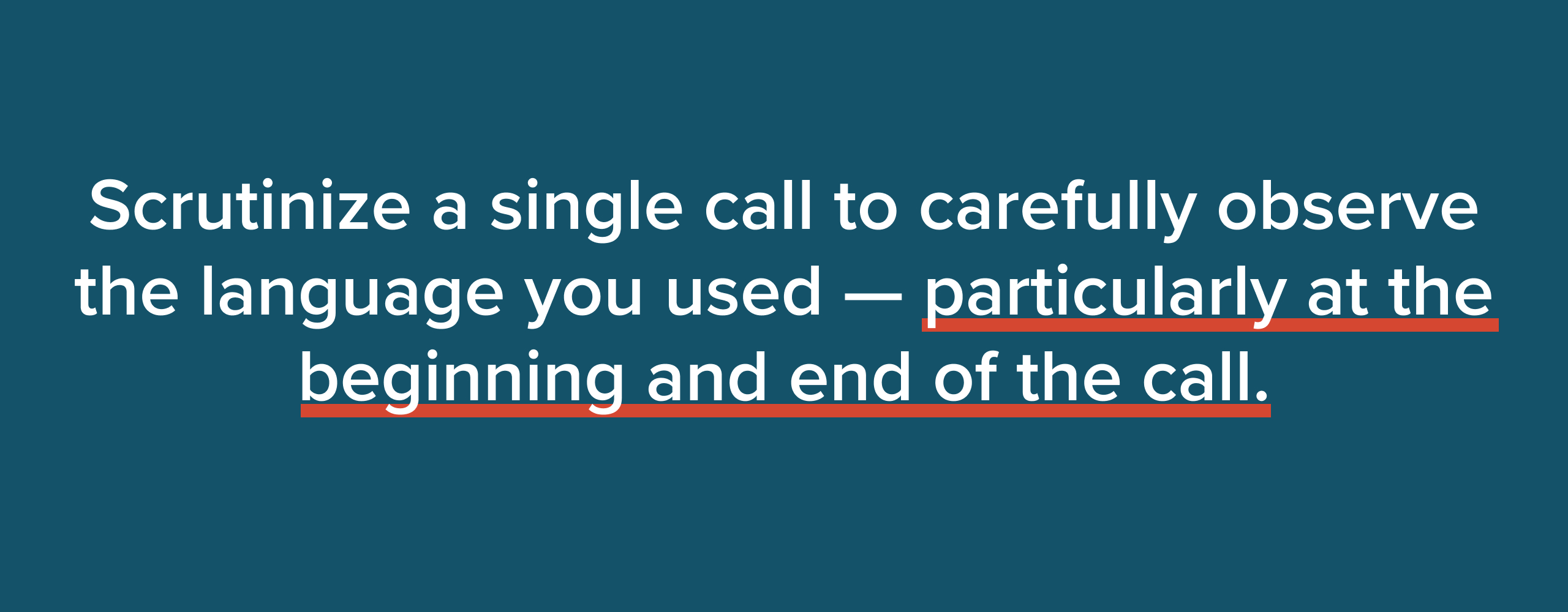
But don’t stop there. Become aware of your non-verbal cues. Facial expressions and body language are critical, too.
Use an AI tool like Chorus or Gong as a second set of eyes to track trends and analyze the language you use during calls.
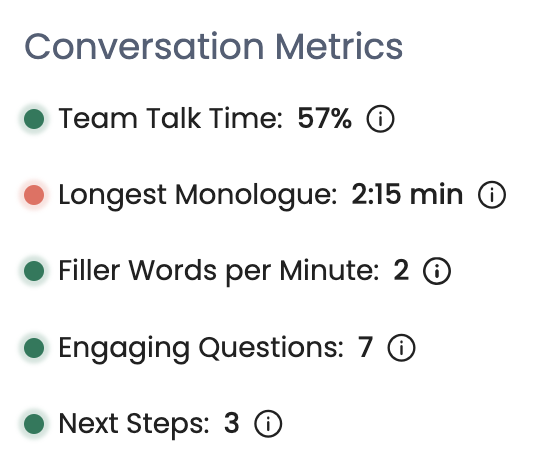
There are even tools today that can track your body language, eye contact, and facial expressions.
Then, after you’ve digested a few calls and gathered this data, make a list of areas of growth and start to plan your improvement.
Remember not to bite off more than you can chew. It’s easy to become discouraged if it feels like the problem is just too big. Instead, channel your focus in one or more ways on your upcoming sales calls:
- Focus on improving one part of the call. For example, work on really nailing the opening — setting the tone, defining outcomes, or building rapport. This way, you set a realistic plan for improvement, rather than trying to change everything at once.
- Focus on eliminating a single tendency. Maybe you laugh nervously, look away when you talk, or fidget when asked a question. Eliminating one negative tendency at a time helps you steadily move toward improvement.
- Focus on eliminating a single word or phrase. It could be a useless filler word or a subordinate phrase, something you use out of habit. Breaking that habit could make a big difference.
Below is Chris's “Weak Sales Words Bingo Card” he made for clients. It looks like this:
%20(2)-png.png)
This mostly gets laughs when he brings it out with clients, but the sentiment behind it is sincere. If you're feeling up to it, have this out when you watch your own sales call. See how many of these weak words have found their way into your vocabulary.
Taking the first step
None of this is something you can fix overnight. And anyone who's a great communicator will tell you that practice makes perfect.
“Nothing beats practice,” Chris believes. “That's the key for communication, is just continually practicing — knowing what your weaker words are and eliminating them over time.”
The key, says Chris, is choosing to see communication as a priority and committing yourself to improvement.
Better language, better conversations
Eliminating weak language from your sales conversations does not mean eliminating warmth, humanity, or kindness. It does not mean acting in a way that is domineering or aggressive.
Instead, it’s about becoming aware of the ways we undervalue ourselves and, in doing so, weaken our message to clients and customers.
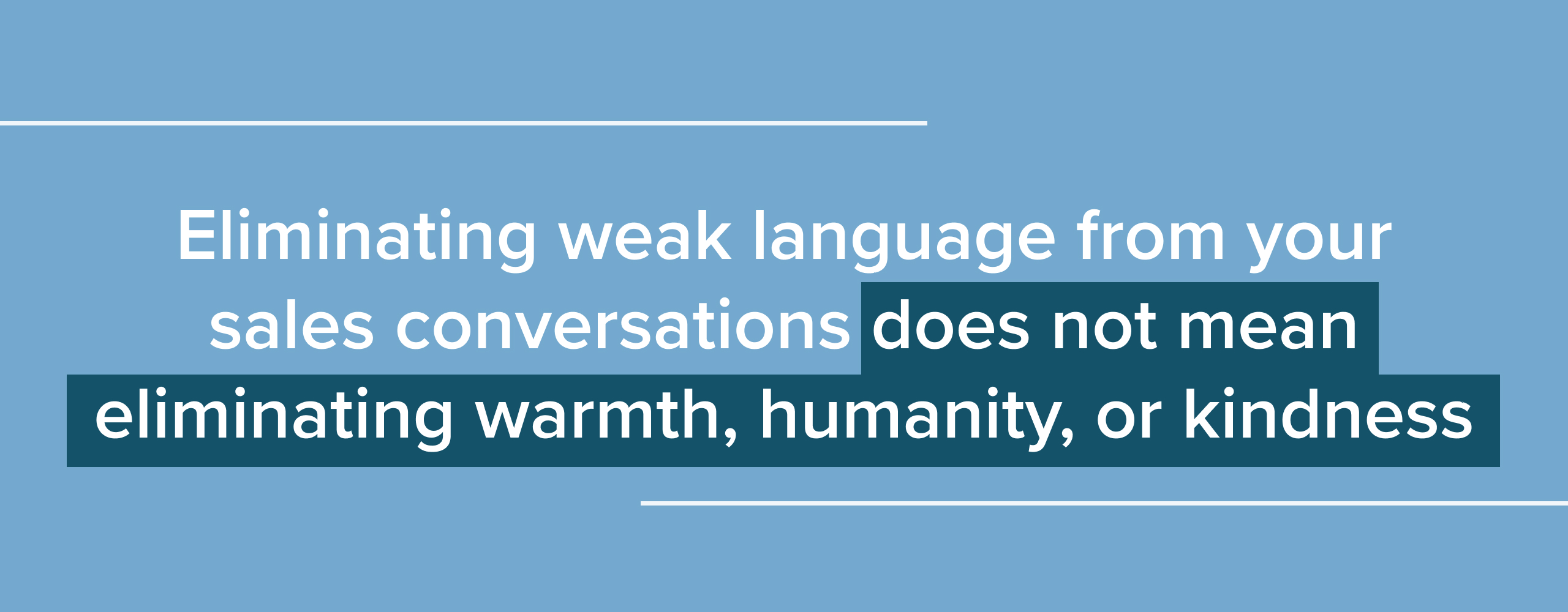
When we are more precise in our communication, we are better able to convey our ideas to our audience.
In her book Radical Candor, Kim Scott notes that “The essence of making an idea clear requires a deep understanding not only of the idea but also of the person to whom one is explaining the idea.”
In all cases, you need to read the room. Sometimes a conversation calls for chit-chat. In most cases, a conversation is in sore need of leadership.
Limiting our own weak language allows us to approach our conversations more transparently. The results benefit ourselves and anyone we speak with.


Order Your Copy of Marcus Sheridan's New Book — Endless Customers!

